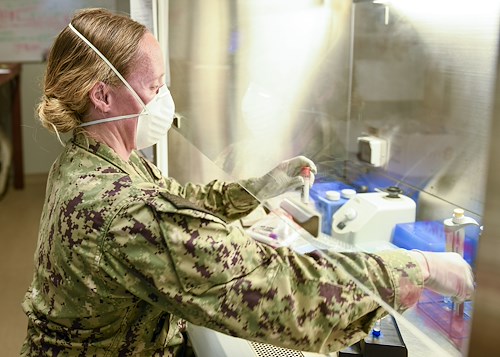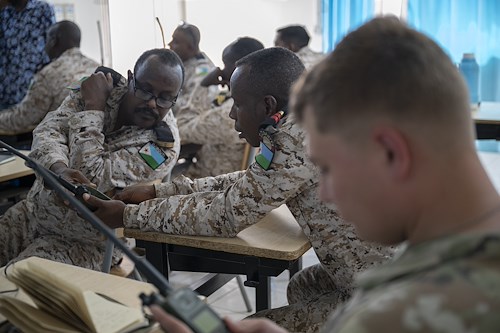Gallery contains 3 images
×
Photo 1 of 3
Combined Joint Task Force - Horn
Lt. Cmdr. Rebecca Pavlicek, U.S. Naval Medical Research Unit – 3 Detachment director of the microbiology laboratory at Camp Lemonnier, Djibouti (CLDJ), tests respiratory specimens for a wide variety of pathogens as a part of the CLDJ disease surveillance program.
Pavlicek is the sole microbiologist serving at CLDJ and provides critical support to Camp Lemonnier, Combined Joint Task Force – Horn of Africa (CJTF-HOA), the U.S. Embassy in Djibouti, and U.S. military members across East Africa. She also supports the Djiboutian Ministry of Health. (U.S. Army photo by Spc. Kiersten Breunig)
Photo by: Spc. Kiersten Breunig
Photo 2 of 3
Combined Joint Task Force - Horn
Lt. Cmdr. Rebecca Pavlicek, U.S. Naval Medical Research Unit – 3 Detachment director of the microbiology laboratory at Camp Lemonnier, Djibouti, inspects samples of camel blood collected by the Djiboutian Ministry of Agriculture. These samples are then tested for various pathogens in a collaborative effort to identify any future disease outbreak concerns that could impact Camp Lemonnier.
Pavlicek is the sole microbiologist serving at CLDJ and provides critical support to Camp Lemonnier, Combined Joint Task Force – Horn of Africa (CJTF-HOA), the U.S. Embassy in Djibouti, and U.S. military members across East Africa. She also supports the Djiboutian Ministry of Health. (U.S. Army photo by Spc. Kiersten Breunig)
Photo by: Spc. Kiersten Breunig
Photo 3 of 3
Combined Joint Task Force - Horn
Lt. Cmdr. Rebecca Pavlicek, U.S. Naval Medical Research Unit – 3 Detachment director of the microbiology laboratory at Camp Lemonnier, Djibouti, works on the preparation and maintenance of the laboratory tests and media needed to be ready to identify any pathogen that might be infecting our service members.
Pavlicek is the sole microbiologist serving at CLDJ and provides critical support to Camp Lemonnier, Combined Joint Task Force – Horn of Africa (CJTF-HOA), the U.S. Embassy in Djibouti, and U.S. military members across East Africa. She also supports the Djiboutian Ministry of Health. (U.S. Army photo by Spc. Kiersten Breunig)
Photo by: Spc. Kiersten Breunig
Camp Lemonnier, Djibouti –
COVID-19 reminded the world of the danger unknown pathogens can present to the world, as the disease swept across the globe, shutting down entire societies in the early days of the pandemic.
For many of us, pathogens are not a common consideration, or at least not at the microscopic level. There are however a select few people and organizations dedicated to identifying, observing, and analyzing this very topic.
Lt. Cmdr. Rebecca Pavlicek, U.S. Naval Medical Research Unit No. – 3 (NAMRU-3) director of the microbiology laboratory at Camp Lemonnier, Djibouti, is one of those people.
“There are a lot of infectious diseases that have threatened the war fighter; COVID is just the most recent one on the scene,” said Pavlicek. “You never know where the next COVID will come from, but we’re ready. We have the knowledge capabilities and technology here to identify any pathogen on the planet.”
Pavlicek is the sole microbiologist serving at Camp Lemonnier, Djibouti and provides critical support to Camp Lemonnier, Combined Joint Task Force – Horn of Africa (CJTF-HOA), the U.S. Embassy in Djibouti, and U.S. military members across East Africa. She also supports the Djiboutian Ministry of Health and Ministry of Agriculture.
When someone is exposed to a virus or other pathogens, it is important for the NAMRU to document the pathogen and identify any special concerns , allowing the unit to look at pathogen threats in the region where military members are serving. Pavlicek can take a test and have results in as little as one to two hours, decreasing the would-be one to two week turnaround time if the test had to be sent to other military medical research facilities in Italy or Germany.
According to Pavlicek, CJTF-HOA personnel rely heavily on this type of support as they tend to travel throughout East Africa for a variety of mission sets. These tests allow treatment and a kind of surveillance capability in the region, helping the NAMRU determine what pathogens might be of concern and giving them ample time to detect and protect service members.
As an extension of their higher headquarters, the Naval Medical Research Center (NMRC) in Silver Spring, Maryland, the NAMRU also shares data allowing experts the time needed to determine force health protection measures to improve readiness of forces in the region. This shared cycle of research and distribution is amplified when experts like Pavlicek deploy and report their results back. Pavlicek, deployed from NMRC, can report and advocate to fund particular, sometimes highly complex and nuanced research studies.
Active testing is just one of the more than 23 projects that Pavlicek and the NAMRU support.
“I have consulted and provided support to over 30 commands and U.S. entities in the region; everything from a possible hemorrhagic fever down to the basic COVID-19 test are done with NAMRU support,” said Pavlicek.
One example of the ongoing projects Pavlicek manages is the testing of mosquitoes for malaria, dengue, chikungunya, and yellow fever. Her team recently detected chikungunya in an unexpected area, allowing her team to proactively identify a disease that might be a threat to our serivce members and the community.
Her team supports key players working alongside CJTF-HOA—including the Civil Affairs East Africa and the CJTF-HOA surgeon cell—to facilitate laboratory assessments, evaluations, quarantines, and provide general support to anyone seeking assistance with pathogen concerns. These roles are essential to ensure the safety of personnel on and off base.
According to Pavlicek, another recent example of collaborating with civil affairs involved going to a local slaughterhouse to inspect the methodologies of how the facility handles the meat prior to it being served to our troops when they visit locations around Djibouti.
The NAMRU-3 has been around since the 1940s. Originally located out of Cairo, Egypt, the Naval Medical Research Unit moved to Italy in 2016. A laboratory remains in Egypt, Ghana, and Djibouti.
“We’re happy to support, because it is a worthwhile mission, making sure everyone can do their missions while providing whatever support we can to regional partners,” said Pavlicek. “This is significantly rewarding and it helps increase my capability and overall understanding of the needs of the DoD and the operational forces. Until I came here, I had not really had the chance to interact with some of the other groups, particularly the special forces. By understanding their needs now, I can help to better develop new and novel technology to support them in the field.”
Infectious diseases have always been adversaries to humanity, and the U.S. military has battled them from the Revolutionary War to Vietnam to today. Non-battle injuries can be a blight to readiness when not approached proactively. Thankfully, NAMRU-3 and other research facilities around the globe detect, observe and analyze pathogen trends to help protect U.S military members and populations from potential devastation.













